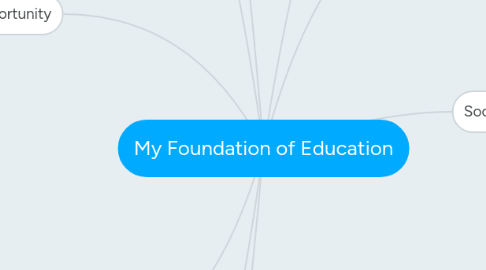My Foundation of Education
by Nicole Kelly


1. Philosophy of Education
1.1. pragmatism
1.2. John Dewey
1.3. progressive education
1.4. teacher role
1.4.1. guide; authoritarian figure
1.5. methods
1.5.1. problem-solving; inquiry method
1.6. curriculum
1.6.1. expanding enviornments
1.7. goal of education
1.7.1. communicated experience
2. Schools as Organizations
2.1. Degree of openness- children are allowed to enroll in public schools and remain in school until they graduate
2.2. Governance- state mandates curriculum, qualifications for teaching, and safety codes
2.3. Size and degree- the larger the district, the more powerful the superintendents. Teachers have fewer opportunities to make decisions with curriculum
2.4. Student composition- U.S schools are becoming more diverse and there is an increase in segregation
2.5. Private schools- contains a lot of diversity
2.6. Private school researcher Donald Erickson
3. Curriculum and Pedagogy
3.1. social meliorist curriculum
3.2. progressive education
3.3. pedagogy practice
3.4. Matt Massey superintendent
3.5. Arther Orr state senate
3.6. George Counts
3.7. Harold Rugg
4. Equality of Opportunity
4.1. Hispanic-American: 62.7 % graduated from high school. 13.9 % received a bachelor's degree
4.2. Ron Edmonds: different schools had significant impact on student learning
4.3. Chubb and Moe: Private schools do it better than public schools.
4.4. Baker and Riordan: argued catholic schools were more elite
4.5. Borman and Dowling: argue race and class are predictors of academic success
4.6. End tracking systems
4.7. Borman and Dowling claim education reform must focus on eliminating the high level of segregation that remains in U.S
5. Educational Inequality
5.1. Cultural Deprivation theory believed poor families were deprived of middle class culture
5.2. Cultural Deprivation theory believed families lacked social skills they needed to be successful in school
5.3. Social Scientist argued it was a race issue
5.4. Critics believed the responsibilities of the schools and teachers were pushed onto the families
5.5. Gender and schooling: Gilligan's noticed society rewards men for "male" behavior and negatively affects women for "female" behavior
5.6. Feminist say school limits educational opportunities and life chances for women.
5.7. Curriculum and Pedagogic practices
5.7.1. Bernstein (1990) working-class neighborhoods are more likely to have authoritarian teacher-directed pedagogic practices
6. Educational Reform
6.1. Intersectional choice-public and private schools
6.2. Intrasectional choice-public schools only
6.3. Intradistrict choice-any option available to students within a given public school district
6.4. Charter schools are public and free from many regulations applied to traditional public schools.
6.5. Charter schools are held accountable for their student performance
6.6. Vouchers claim they will provide low-income parents with the same choices as middle-class
6.7. Vouchers say they will provide better learning environments for low-income students and result in higher achievement
7. Politics of Education
7.1. Liberal Perspective
7.2. Progressive visions
7.3. Franklin Delano Roosevelt
7.4. New Deal Era
7.5. John Dewey
7.6. John Maynard Keynes
8. History of U.S. Education
8.1. Progressive and traditional reform
8.2. Democratic-Liberal school
8.3. Child-centered reform
8.4. Lawrence A. Cremin
8.5. New progressivism
8.6. Larry Cuban
9. Sociological Perspectives
9.1. Knowledge and Attitudes
9.2. Employment
9.3. Institutional level
9.4. Interpersonal level
9.5. Interactional theories
9.5.1. Basil Berstein
9.6. Conflict theories
9.6.1. Lareau
